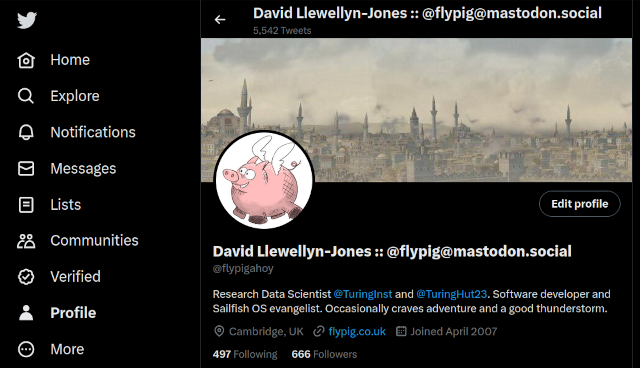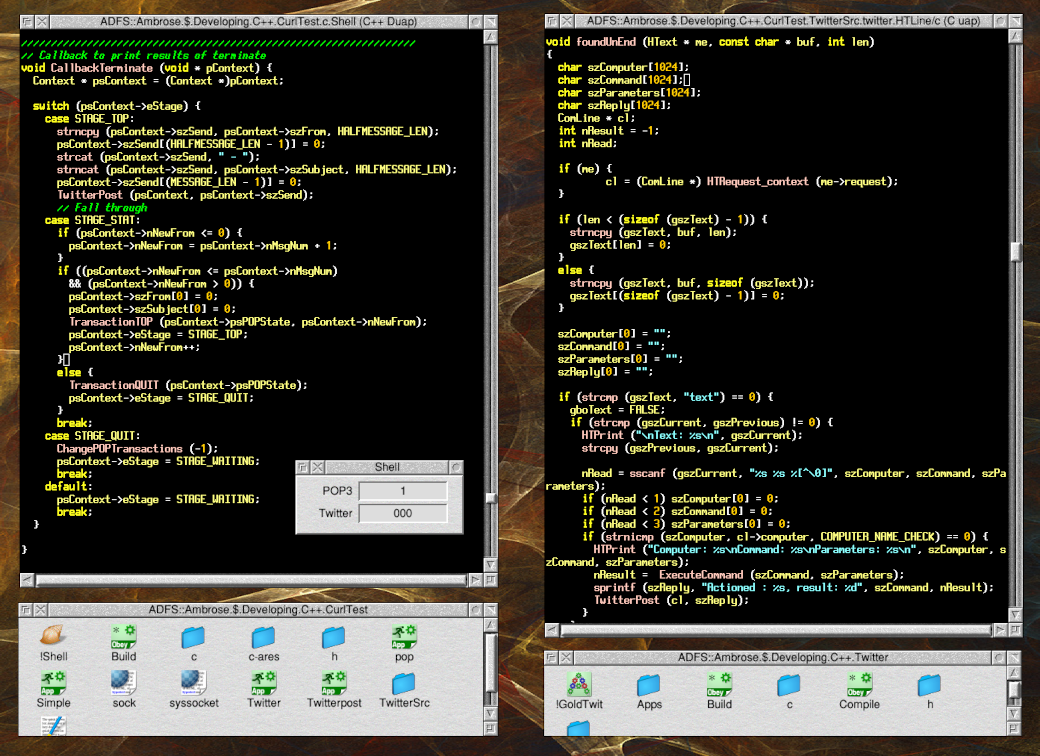List items
Items from the current list are shown below.
Blog
16 Jul 2023 : Freedom Road #
It's time for me to leave Twitter. There's been plenty written about the recent — and not so recent — changes at Twitter. I have my own reasons for wanting to leave, which I'll write more about in a second. But the long and short of it is that Twitter is no longer part of the open Web. You now have to be logged-in to view content and that's completely antithetical to my approach to the Web,
Twitter has always felt anomalous to me. I created an account back in 2007 on the advice of my brother in law, who foresaw the great potential of the Twitter API. When I look at Twitter's trajectory since then, I'm reminded of how prescient that was.
Since then I've tried to make the most of Twitter and its API. I wrote my firt bot in July 2007 called GoldTwit which periodically posted gold prices (also suggested to me by my brother in law). Back then Twitter had fist-class SMS integration, meaning you could achieve what you'd now use push notifications for, without having to worry about gateways or costs.
Then I wrote an app called Twitterpost that periodically checked my email server for new mail, posting the sender and subject line to Twitter. You can see some of the code for it on the left hand side of the screenshot below. It's so long ago that I don't properly recall why I needed it, but from my Twitter feed I can see it ran between September and April 2008.
I went on to create a bot for controlling my RISC OS machine using the site. I could post commands to my Twitter feed, which my machine would automatically pick up and act on (reply with a status update; run an application; execute a star command). That was probably my most interesting utilisation. Some of the code for this is shown on the right hand side of the screenshot.
Then for I while I had details of every Subversion and Git project commit logged to my Twitter feed. I thought it would make my profile more interesting, but it almost certainly had the reverse effect.
More recently I developed a Twitter Quine written in Python: run the quine and it will post a copy of its own code to your Twitter feed.
Somewhat weirdly I can still view the workings of these going back sixteen years (from quines, to appointments, to gold) on my private development Twitter feed.
After all this, I still never really got Twitter for actual social networking purposes. Tweets are too short to say anything meaningful; my home timeline flows too fast to focus on any particular topic; the threading design makes following conversations painful.
I do understand why it's useful for some; especially companies, journalists and politicians. This was brought home to me listening to a politician on the Westminster Hour. Sadly too long ago for me to remember who or to be able to find it in the archives, but she explained that it had been revolutionary in allowing for the first time ever for her to have public conversations with her constituents. This makes sense to me: if you want to have 'one-to-many' conversations, where you're controlling the narrative, broadcasting to many people, receiving a general sentiment back, then Twitter looks like the perfect tool. I'd question whether it's a valid conversation, but I can understand why that's attractive for some. Definitely not me though.
Despite this, for many years it's been the only social network I've been able to stomach. I pretended to myself that, since all my tweets are public, that made it less privacy-violating, more open, and less susceptible to subversive tracking, than other social networks like Facebook, Instagram or Google Plus. I liked the fact my timeline was deterministic: just tweets and retweets from people I explicitly follow. Finally, Twitter was the only 'first-class' social network for Sailfish OS, the only one with operating system level integration.
If you've been following recent Twitter developments you'll know that, apart from this very last point, almost all of this has now changed. The Twitter API has been debilitated through throttling and pay-walling. Tweets can only be viewed by users who are logged in. My timeline has been wrested from me by an algorithm; it's now full of tweets from people I don't recognise saying things that don't interest me. Access using my preferred Sailfish OS Twitter client has been blocked.
As a centralised, closed-source, for-profit resource, this was always somewhat inevitable. It feels like it's taken a surprisingly long time to reach this point. But it has.
To be clear, not all of the recent changes have been bad. I particularly applaud Twitter's apparent aim of shifting from advertising to a subscription-based funding model. I'm quite happy to pay for Web services; already do in other cases. I wish more of the Web would offer subscriptions as an alternative to tracking. But speaking frankly, Twitter just isn't valuable enough to me for this to be worth my while.
Plus, Mastodon fulfils all of my requirements, with none of the downsides: federated, open source, open API, controllable, deterministic, tracking-free.
So it's time to park up my rig and walk away.
I'll be sad to inevitably lose contact with people as a result of leaving Twitter. I don't have many followers and have even fewer on Mastodon. I sincerely hope anyone who cares enough to want to follow will join me there. Mastodon is doing a much better job at fulfilling the potential of the Web, and has a much better chance of sticking to it.
Twitter has always felt anomalous to me. I created an account back in 2007 on the advice of my brother in law, who foresaw the great potential of the Twitter API. When I look at Twitter's trajectory since then, I'm reminded of how prescient that was.
Since then I've tried to make the most of Twitter and its API. I wrote my firt bot in July 2007 called GoldTwit which periodically posted gold prices (also suggested to me by my brother in law). Back then Twitter had fist-class SMS integration, meaning you could achieve what you'd now use push notifications for, without having to worry about gateways or costs.
Then I wrote an app called Twitterpost that periodically checked my email server for new mail, posting the sender and subject line to Twitter. You can see some of the code for it on the left hand side of the screenshot below. It's so long ago that I don't properly recall why I needed it, but from my Twitter feed I can see it ran between September and April 2008.
I went on to create a bot for controlling my RISC OS machine using the site. I could post commands to my Twitter feed, which my machine would automatically pick up and act on (reply with a status update; run an application; execute a star command). That was probably my most interesting utilisation. Some of the code for this is shown on the right hand side of the screenshot.
Then for I while I had details of every Subversion and Git project commit logged to my Twitter feed. I thought it would make my profile more interesting, but it almost certainly had the reverse effect.
More recently I developed a Twitter Quine written in Python: run the quine and it will post a copy of its own code to your Twitter feed.
Somewhat weirdly I can still view the workings of these going back sixteen years (from quines, to appointments, to gold) on my private development Twitter feed.
After all this, I still never really got Twitter for actual social networking purposes. Tweets are too short to say anything meaningful; my home timeline flows too fast to focus on any particular topic; the threading design makes following conversations painful.
I do understand why it's useful for some; especially companies, journalists and politicians. This was brought home to me listening to a politician on the Westminster Hour. Sadly too long ago for me to remember who or to be able to find it in the archives, but she explained that it had been revolutionary in allowing for the first time ever for her to have public conversations with her constituents. This makes sense to me: if you want to have 'one-to-many' conversations, where you're controlling the narrative, broadcasting to many people, receiving a general sentiment back, then Twitter looks like the perfect tool. I'd question whether it's a valid conversation, but I can understand why that's attractive for some. Definitely not me though.
Despite this, for many years it's been the only social network I've been able to stomach. I pretended to myself that, since all my tweets are public, that made it less privacy-violating, more open, and less susceptible to subversive tracking, than other social networks like Facebook, Instagram or Google Plus. I liked the fact my timeline was deterministic: just tweets and retweets from people I explicitly follow. Finally, Twitter was the only 'first-class' social network for Sailfish OS, the only one with operating system level integration.
If you've been following recent Twitter developments you'll know that, apart from this very last point, almost all of this has now changed. The Twitter API has been debilitated through throttling and pay-walling. Tweets can only be viewed by users who are logged in. My timeline has been wrested from me by an algorithm; it's now full of tweets from people I don't recognise saying things that don't interest me. Access using my preferred Sailfish OS Twitter client has been blocked.
As a centralised, closed-source, for-profit resource, this was always somewhat inevitable. It feels like it's taken a surprisingly long time to reach this point. But it has.
To be clear, not all of the recent changes have been bad. I particularly applaud Twitter's apparent aim of shifting from advertising to a subscription-based funding model. I'm quite happy to pay for Web services; already do in other cases. I wish more of the Web would offer subscriptions as an alternative to tracking. But speaking frankly, Twitter just isn't valuable enough to me for this to be worth my while.
Plus, Mastodon fulfils all of my requirements, with none of the downsides: federated, open source, open API, controllable, deterministic, tracking-free.
So it's time to park up my rig and walk away.
I'll be sad to inevitably lose contact with people as a result of leaving Twitter. I don't have many followers and have even fewer on Mastodon. I sincerely hope anyone who cares enough to want to follow will join me there. Mastodon is doing a much better job at fulfilling the potential of the Web, and has a much better chance of sticking to it.


Comments
Uncover Disqus comments